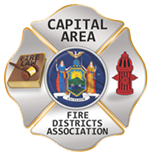Soliciting Competition for Professional Services
Tom Rinaldi, President AFD-CA
This article is being provided as an educational service for the fire districts represented by the Association of Fire Districts of the Capital Area.
Through the first seven months of 2021, the Office of the State Comptroller (OSC) has issued 21 reports on audits they have performed on fire districts. The majority of them address the lack of oversight the board of fire commissioners has over financial activities (and the treasurer). However. two recent reports addressed the procurement of professional services and the perceived lack of competition sought in securing those professional services. The most recent was released in July, 2021. The OSC further addressed professional services procurement for all local governments in a report issued in July 2018. The Office of General Services also maintains a website specifically dedicated to procurement for municipalities. Links to these reports and resources are below.
We believe competition is good for the consumer and/or the taxpayers of a fire district. There are few options, it opens opportunities for vendors to seek their own interest and not that of the consumer. Without competition, there tends to be less innovation, higher prices, and a lack of customer service. On the other hand, competition keeps potential vendors sharp – they tend to pay more attention to the needs of fire districts and create products and services that will meet their needs at reasonable prices.
Generally, a fire district is not statutorily required to seek competition or use a request for proposal (RFP) process when seeking professional services. One exception is when hiring a certified public accountant to audit the fire district’s financial statements. Rather, a fire district is bound by its own adopted procurement policy, which each fire district should have based on their circumstances. The reports released by the State do not state that a fire district requires the use of an RFP process, but they do make it clear that a fire district should go through the process of seeking competition before awarding a professional service contract.
From our viewpoint, the challenge with using an RFP process when soliciting a professional service is that an RFP is generally about meeting a certain specification – can the proposer meet all the stated requirements (specifications) of the request. There is no opportunity for intangibles of value such as experience, diligence or dedication that are difficult to define in an RFP. There are several inherent problems with using RFPs for professional services:
- Most times, the fire district doesn’t actually know what it wants (doesn’t know what it doesn’t know) and so the RFP is incomplete and/or inaccurate and may eliminate qualified vendors for unnecessary reasons.
- RFPs usually result in longer detailed contracts and if the fire district is unhappy, it is hard to make changes until the term of the contract expires, which could be as long as 5 years.
- Conversely, if the contract awarded through an RFP process is too short or vague, vendors may not bid as the effort isn’t worth it, and may result in unhappy customers as costs increase when customers realize what is really needed, adding more time and cost.
- Myriad of other reasons likely stemming from fire districts that are unable to define their specific needs.
When you as an individual make a purchase, you rarely make the purchase purely on specifications. In reality, most people buy a story. A story that typically makes them feel good about their purchase, in addition to the product meeting a certain specification. Apple is great at selling a story in order to get consumers to pay more for a phone that doesn’t offer significantly better benefits than other phones (or, the benefit it does offer are not that valuable to the consumer to justify the additional cost). In professional services, relationship, chemistry, loyalty and overall “fit” are very important in the decision-making process. However, when those factors are prioritized, it could lead to a fire district paying more or perhaps not getting all the services they could receive from a competing vendor. In other words, the story a fire district might tell itself about working with a certain professional (such as how long they’ve been a client or the good things that vendor might do for the fire service) may be preventing that fire district from getting a better experience elsewhere. Soliciting competition at least gives a fire district the opportunity to see if “your guy” is offering the best service at a reasonable (not always best) price. While OSC may be looking for an RFP, what they are really looking for is the process, are you going through the process of determining if your fire district is getting the most bang for its buck, not because you like the company logo.
As a fire district commissioner, you should be looking closely at each of the vendors and the fees that they charge for the services they provide. We can also learn from the guidance issued by OSC in their audit reports. Fire districts should seek out vendors who want to partner with them and not lock in long term obligations so they can drive up billable hours. Keeping professional services providers hungry and honest will discourage bad behavior. A fire district should delineate clear expectations in writing, so a determination can be made at the end of each year if all services were provided and if they were performed adequately.
References:
Professional Service Procurement: Considerations for Local Officials
Local Government Management Guide – Seeking Competition in Procurement
https://www.osc.state.ny.us/files/local-government/publications/pdf/seekingcompetition.pdf
Bidding 101
https://ogs.ny.gov/procurement/bidding-101
Procurement for Municipalities
https://ogs.ny.gov/procurement/procurement-municipalities
Contact the NYS OSC Division of Local Government and School Accountability,
518-408-4934 or at localgov@osc.ny.gov
